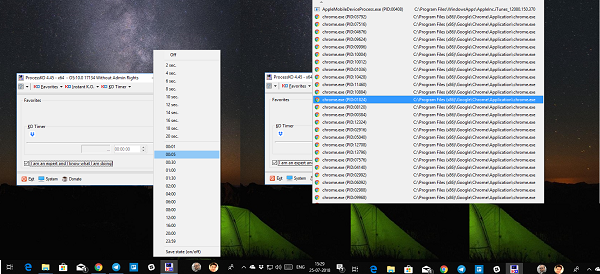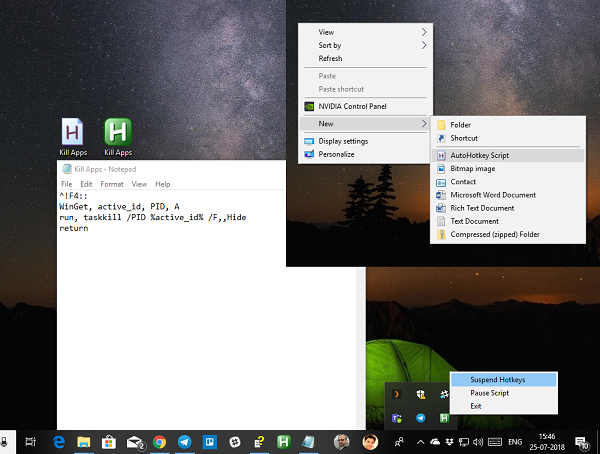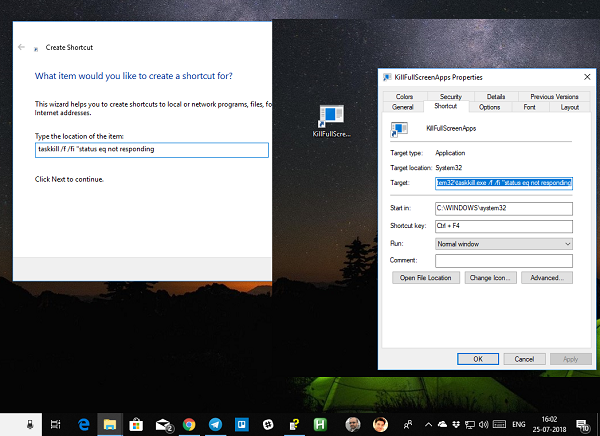The Task Manager had always been a popular tool to kill any application on Windows. Any program which doesn’t respond or closes the usual way (the X button) can be killed using the Task Manager. However, things are a little different when it comes to full-screen applications, and games that always want to stay on top. Some such applications somehow disable the standard hotkeys so that you can even switch to another application and forcefully close those applications. You might not be able to use shortcuts like Alt + TAB or Win + Tab and so on. If you are stuck with one such app or game, there are some free tools that can help you to forcefully terminate such a full-screen application or game.
Tools to forcefully terminate a full-screen application or game
Windows 11/10 offers a good solution with Alt + Ctrl + Delete. When you press this combination, it takes over the complete screen and then offers you lock, switch user, sign out and Task Manager. Try this first, and if it works, nothing like that – if not try these free tools:
- SuperF4
- ProcessKO
- AutoHotkey Script
- TaskKill Command Shortcut
- Process Assassin
- Task Killer
- One Click App Killer.
1] SuperF4
Available for both 32 and 64 bit, this application also offers keyboard shortcut- Ctrl+Alt+F4 which kills any application which is in the foreground. And, yes it’s portable. Once you download the application, keep it in place from where you will not delete it. Launch the program, and it stays quietly in the system tray waiting for those hotkeys to be pressed.
It also offers an xKill mode. When you press WIN + F4, it launches a skull icon in place of your mouse cursor. You can then drop it on any application you want to close. In case you don’t want to kill it or on a wrong application, press ESC or escape on your keyboard, and it will exit.
Some games have anti-keylogger protection, which may prevent SuperF4 from working. To resolve this, enable the TimerCheck option to enable an alternate way to detect those keys. Right-click on the icon, and you can see options like elevate, elevate on start, and Timercheck. It is available here.
Read: How to force quit a full-screen always-on-top Program or Game.
2] ProcessKO
It’s a portable utility that can kill full-screen applications or games using a keyboard shortcut. Once you download and launch it just use Ctrl+Alt+F4 to kill the foreground process. You can also use Ctrl+Alt+F5 to relaunch the program instead of just killing it.

Apart from this, the application also offers a timer utility using which you can kill a pre-selected application after some time. If this is one of your requirements, you can add programs to your favorite list, and access them anytime. The application can be set to launch with Windows and sit in your system tray after closing it. Get it here.
3] AutoHotkey Script

AutoHotKey is a very popular program used for creating custom shortcuts, and also automate tasks. You can use the below mention details to create a script and launch it using a shortcut when required.
^!F4:: WinGet, active_id, PID, A run, taskkill /PID %active_id% /F,,Hide return
Once you create a script, compile it, and it double-click to launch it. This will quietly sit in your system tray. When you want to kill a foreground application, just use Ctrl+Alt+F4 to terminate the program forcefully.
Read: How to force close a Program which Task Manager cannot terminate.
4] TaskKill Command Shortcut
If you know how to create keyboard shortcuts for applications, you can use the below-mentioned taskkill command to create a shortcut to kill any foreground applications. Basically, all these programs use this internally-
taskkill /f /fi "status eq not responding
Right-click on the desktop, and create a new shortcut. When selecting a program for the shortcut, you can add the command mentioned above, and save it. Now right click on the shortcut, and select properties. Switch to the Shortcut tab, and type a combination of keys that will launch the program from anywhere.

Windows will add Ctrl + Alt to this, but you can change it to Ctrl + Shift + [Key] or Ctrl + Shift + Alt + [Key]. Just make sure you are not using the same shortcut for any other program.
5] Process Assassin
You can also use a 3rd-party tool, like freeware Process Assassin. This tool enables the user to select a Not Responding application and terminate it immediately without calling any other external programs. There are options available too.
6] Task Killer
This tool offers a neat way to unload frozen applications, processes or services. It shows the tasks, windows, and services in a pop-up menu.
7] One Click App Killer
This tool doesn’t have an interface. Once you run it, your cursor gets transformed into a small round target. You basically have to click anywhere on the frozen application’s interface to terminate it instantly. This utility is a Windows clone of Xkill, from the Unix world.
NOTE: In Windows 11/10, now, you can also terminate or close preinstalled system apps from Settings.
I am sure that there are many applications out there that can do this for you. However, we have only listed which are easy to use and works without a problem. Let us know if you are using something different.
TIP: Check this post if you want to find out how you can terminate ALL running applications instantly.
Is it better to run games fullscreen or windowed?
One of the most significant advantages of playing games on full screen is that it eliminates distractions from other applications, which helps you focus entirely on the game. On top of it, the performance improves because there is no other element to render, which will be in the case of a windowed application. However, if you need to use two window side by side, then going full-screen doesn’t help. The best would be to use two monitors, if possible, each dedicated to its section.
What is the full-screen shortcut in Windows?
You can use F11, which works on most web browsers; Alt+Enter can help you switch to full-screen for applications. You can also use the Windows key + Shift + Enter shortcut to activate full-screen mode in Windows. If these don’t work, then you need to check with the application settings.
TIP: Most often, when you use the CTRL + ALT + DEL shortcut key, and you can not access TASK MANAGER because the full screen application has crashed and is preventing this access to TASK MANAGER, simply click on the TASK MANAGER icon in the tray and enable the always on top. This solves the problem.